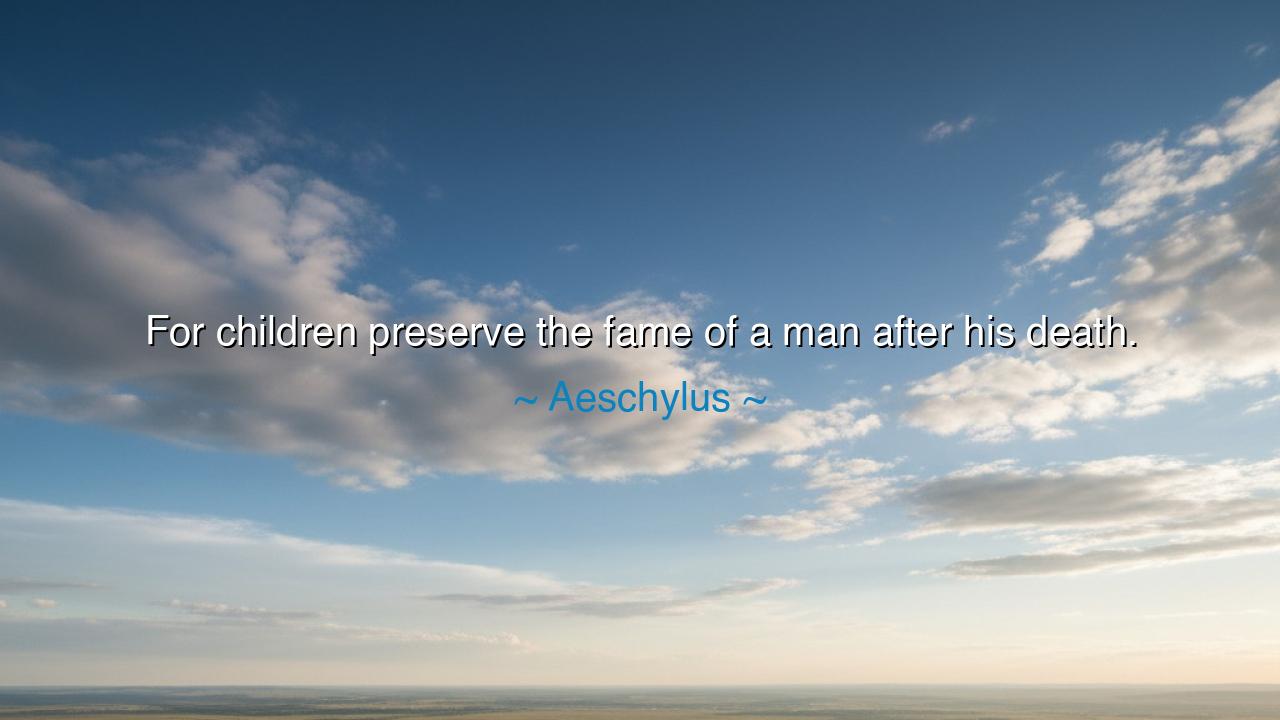
For children preserve the fame of a man after his death.






When Aeschylus, the father of Greek tragedy, declared, “For children preserve the fame of a man after his death,” he spoke not merely of lineage or inheritance, but of the sacred chain that binds generations together through time. In this saying, there resounds an ancient truth: that a man’s deeds do not end with his final breath, but live on in those he has nurtured, taught, and loved. Children — whether of blood or of spirit — are the living echoes of their parents’ souls, carrying forward the essence of who they were, long after the dust of their bodies has mingled with the earth.
In the age of Aeschylus, honor and remembrance were the pillars of immortality. The Greeks believed that to be forgotten was to die twice — once in body, and again in memory. Yet to be remembered was to live beyond the grave, your name spoken upon the lips of your descendants, your virtues sung in their deeds. Thus, children were not merely heirs of property, but guardians of legacy, keepers of their forebears’ flame. The father’s courage, the mother’s wisdom, the family’s virtues — these became the inheritance more lasting than gold or land. To raise a child was to build a monument that no war could destroy.
This idea is not bound by time or culture. In every civilization, from the temples of Egypt to the villages of China, the continuation of the family line has been regarded as a sacred duty. To have children was not only a joy but a covenant with the future. They were the living scripture of one’s life, the walking testament of one’s values. Through them, a man could speak to centuries unborn. In this way, Aeschylus reminds us that true fame — the kind that endures — is not written in stone or carved upon monuments, but woven into the living hearts of those who follow after us.
Consider the story of Marcus Aurelius, the philosopher-emperor of Rome. Though crowned in splendor, he was also a humble father who sought to teach his son the wisdom of the Stoics — to rule not by power, but by virtue. Yet his son Commodus did not follow the noble example, and his tyranny cast a shadow upon his father’s memory. In this tragedy, the words of Aeschylus find their echo: for as the child preserves the fame of the father, so too can he tarnish it. Thus, the legacy of a man is not only in what he builds, but in whom he shapes. The child is both the reflection and the continuation of the parent’s soul.
But children need not be of flesh alone. Every teacher who shapes a mind, every artist who births beauty into the world, every soul who inspires another to goodness — all these bear spiritual children, and through them, their light endures. Socrates had no sons of blood, yet his students carried his wisdom across millennia. His ideas live still, as vividly as when he walked the streets of Athens. So too can any of us leave such heirs — through our words, our kindness, our courage, and our faith. The children of the spirit are as mighty as those of the body.
The lesson of Aeschylus is thus a call to stewardship — to raise well those who come after, and to plant in them the seeds of virtue. The fame he speaks of is not shallow renown, but the enduring respect born of righteousness, love, and wisdom. A man who leaves behind wealth but not goodness leaves emptiness; but one who passes on integrity, compassion, and courage builds a lineage that time cannot erode. For every child, whether bound by blood or by heart, is a living vessel of remembrance — a story still unfolding from the life that birthed it.
Therefore, let this be your charge: live so that those who follow you will speak your name with reverence, not merely as ancestor, but as example. Nurture your children — of flesh, of mind, or of soul — with gentleness, integrity, and awe for the divine order of life. For in them, your fame will not fade, but flourish. And when death comes to claim the body, it shall find only the shell, for your spirit will already walk onward — alive in the laughter, the wisdom, and the courage of those who carry your light into the dawn.






AAdministratorAdministrator
Welcome, honored guests. Please leave a comment, we will respond soon